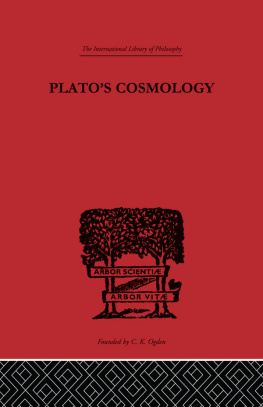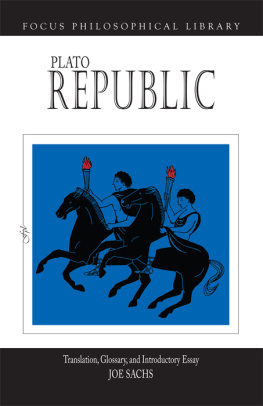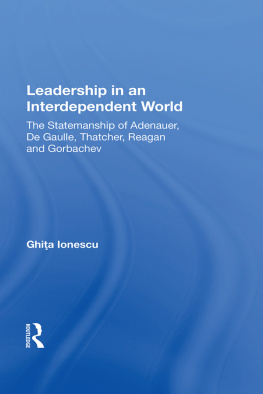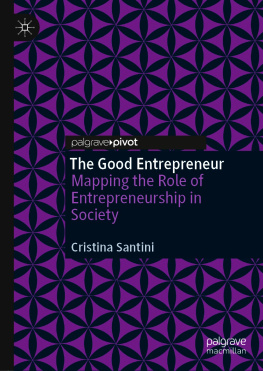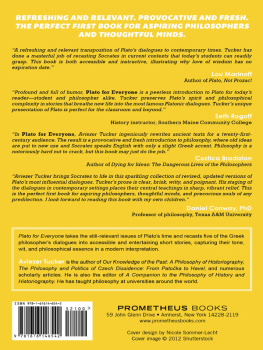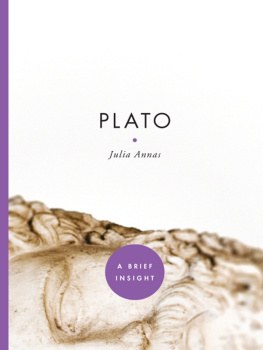Cristina Ionescu - On the Good Life thinking through the intermediaries in Plato’s Philebus
Here you can read online Cristina Ionescu - On the Good Life thinking through the intermediaries in Plato’s Philebus full text of the book (entire story) in english for free. Download pdf and epub, get meaning, cover and reviews about this ebook. year: 2019, publisher: State University of New York Press, genre: Science. Description of the work, (preface) as well as reviews are available. Best literature library LitArk.com created for fans of good reading and offers a wide selection of genres:
Romance novel
Science fiction
Adventure
Detective
Science
History
Home and family
Prose
Art
Politics
Computer
Non-fiction
Religion
Business
Children
Humor
Choose a favorite category and find really read worthwhile books. Enjoy immersion in the world of imagination, feel the emotions of the characters or learn something new for yourself, make an fascinating discovery.
- Book:On the Good Life thinking through the intermediaries in Plato’s Philebus
- Author:
- Publisher:State University of New York Press
- Genre:
- Year:2019
- Rating:3 / 5
- Favourites:Add to favourites
- Your mark:
- 60
- 1
- 2
- 3
- 4
- 5
On the Good Life thinking through the intermediaries in Plato’s Philebus: summary, description and annotation
We offer to read an annotation, description, summary or preface (depends on what the author of the book "On the Good Life thinking through the intermediaries in Plato’s Philebus" wrote himself). If you haven't found the necessary information about the book — write in the comments, we will try to find it.
Cristina Ionescu: author's other books
Who wrote On the Good Life thinking through the intermediaries in Plato’s Philebus? Find out the surname, the name of the author of the book and a list of all author's works by series.
On the Good Life thinking through the intermediaries in Plato’s Philebus — read online for free the complete book (whole text) full work
Below is the text of the book, divided by pages. System saving the place of the last page read, allows you to conveniently read the book "On the Good Life thinking through the intermediaries in Plato’s Philebus" online for free, without having to search again every time where you left off. Put a bookmark, and you can go to the page where you finished reading at any time.
Font size:
Interval:
Bookmark:


O N THE G OOD L IFE
SUNY series in Ancient Greek Philosophy
Anthony Preus, editor
O N THE G OOD L IFE
Thinking through the Intermediaries in Platos Philebus
Cristina Ionescu

Published by State University of New York Press, Albany
2019 State University of New York
All rights reserved
Printed in the United States of America
No part of this book may be used or reproduced in any manner whatsoever without written permission. No part of this book may be stored in a retrieval system or transmitted in any form or by any means including electronic, electrostatic, magnetic tape, mechanical, photocopying, recording, or otherwise without the prior permission in writing of the publisher.
For information, contact State University of New York Press, Albany, NY
www.sunypress.edu
Library of Congress Cataloging-in-Publication Data
Names: Ionescu, Cristina, 1977 author.
Title: On the good life : thinking through the intermediaries in Platos Philebus / Cristina Ionescu.
Description: Albany : State University of New York, 2019. | Includes bibliographical references and index.
Identifiers: LCCN 2018036279 | ISBN 9781438475073 (hardcover : alk. paper) | ISBN 9781438475080 (ebook)
Subjects: LCSH: Plato. Philebus.
Classification: LCC B381 .I56 2019 | DDC 171/.4dc23
LC record available at https://lccn.loc.gov/2018036279
10 9 8 7 6 5 4 3 2 1
To my mother,
who gracefully danced all the steps in between
The gods, as I said, have left us this legacy of how to search, and learn, and teach one another. But nowadays the clever ones among us make a one, haphazardly, and a many, faster or slower than they should; they go immediately from the one to the unlimited and omit the intermediaries, while it is exactly these that make all the difference as to whether we are engaged with one another in dialectical or only in eristic discourse.
Philebus 16e317a5
Contents
Acknowledgments
T his is a book about what it means to live a good life by aiming at the right combination of pleasure and knowledge, about the importance of the intermediary steps between given circumstances and the ideal result aimed for, about the significance of thorough reasoning through relevant distinctions, about due measure in words as well as in deeds, about listening, learning, and teaching, and certainly about Platos Philebus , which sparked and sustained my interest in thinking along these lines over the last ten years.
In a world whose predilection is for an all-or-nothing mindset, and in which the divide between polarized alternatives has become the norm, it is timely to pause and reflect on the importance of mediation. This book is an invitation to recuperate the joy for figuring out not how to proceed absolutely, but rather how best to proceed in the very next step. It might at first seem paradoxical that one would turn to Plato to learn about mediation, when Platos name has typically been associated with lofty ideals, and the most frequent criticism coming even from the quarters of expert scholars is that his approach is too idealistic and lacks interest in the concrete circumstances of our lives. Part of my intention here is to challenge the received view of a Plato detached from the concerns of our day to day life and from the weaknesses and vulnerabilities that make up the laced and layered texture of our lives. In the Philebus , perhaps even more than in other texts, Plato teaches us about the value of the immediately given, about the proper appreciation of the fleeting beauty of a simple musical tone, about the transient, yet meaningful, pleasures we take in our emotional life, about how laughing at what we find ridiculous reveals our ethical stance, while comedy and self-irony can become instruments for moral instruction, and about so much else.
I am profoundly indebted to a number of scholars and friends who have offered me tremendous support by engaging with my work over the years. The intellectual stimulation received by discussing with them numerous ideas that find their home in the pages of this book would not mean to me as much as it does, had it not been constantly joined by their steady and dedicated emotional support and encouragement. I wish to thank especially Kenneth Dorter, George Harvey, Zena Hitz, Marina McCoy, Mitchell Miller, Dana Miller, and Rachel Singpurwalla, who have been most keenly part of this experience. George Harveys perceptive critical eye, his insight into things Platonic, and generous willingness to engage with my work have been the source of abundant pleasures of learning and joys of discovery at my end. He continues to inspire me. Mitchell Millers nuanced suggestions and inexhaustible energy in offering hundreds of comments on earlier drafts of portions of this work have been of tremendous help. Kenneth Dorter remains my mentor in mediations both in the life of the mind and way beyond that.
I am grateful to the amazing graduate students I have had throughout the years at The Catholic University of America, who with their eager appetite for philosophical conversations have helped me refine my understanding of the Philebus and kept my interest for this dialogue alive. I learned so much from them! I thank especially Kevin Kambo and Nick Gerrard, who helped with proofreading and editing while preparing the manuscript for publication. I am very thankful for the leisure provided by a sabbatical semester in the spring of 2017, which helped a great deal toward making this project come together.
I am grateful for the help and support offered by the editors and staff at SUNY Press, who have made the process of this publication run very smoothly.
I am especially thankful to John Garner for engaging in detail with my work, as he went way beyond the call of duty as reviewer of my manuscript and generously offered his comments, in shared enthusiasm for Platos Philebus. His comments are starting points for conversations that I look forward to continue over years to come.
The wonderful and supportive staff members working at the Library of Congress in the Hispanic Reading Room, which had become my work space during the Spring Semester of 2017, deserve my gratitude.
There are many more people who deserve my heartfelt thanksfamily, friends, teachers, and students. Without them my own modest reflections on the good life would not have gotten a life of their own in the pages of this book and would have missed a great deal of experiential support that enabled them in the first place. You know who you are.
My siblings and their wonderful families provided steady support and living inspiration throughout this journey. I would not miss the joy of thanking them and mentioning their names in any book I write, so here they go: Diana, Lucian, Kyla, Aidan, Radu, Ioana, Tea, and Vlad. Above all, the memory of my mother, to whom this book is dedicated, remains for me the guiding light in life.
The first four chapters are based on articles that have appeared in print before and are here reprinted in revised version with permission from the editors. The Unity of the Philebus: Metaphysical Assumptions of the Good Human Life, Ancient Philosophy 27 (2007): 5575; Platos Understanding of Pleasure in the Philebus : Absolute Standards of Repletion and the Mean, Journal of Philosophical Research 33 (2008): 118; Hybrid Varieties of Pleasure and the Complex Case of the Pleasures of Learning in Platos Philebus , Dialogue 47 (2008): 123; The Place of Pleasure and Knowledge in the Fourfold Articulation of Reality in Platos Philebus , pp. 132 in The Proceedings of the Boston Area Colloquium in Ancient Philosophy , vol. XXX (2015). I thank the respective editors and publishers for the permission to reprint those materials here.
Font size:
Interval:
Bookmark:
Similar books «On the Good Life thinking through the intermediaries in Plato’s Philebus»
Look at similar books to On the Good Life thinking through the intermediaries in Plato’s Philebus. We have selected literature similar in name and meaning in the hope of providing readers with more options to find new, interesting, not yet read works.
Discussion, reviews of the book On the Good Life thinking through the intermediaries in Plato’s Philebus and just readers' own opinions. Leave your comments, write what you think about the work, its meaning or the main characters. Specify what exactly you liked and what you didn't like, and why you think so.



